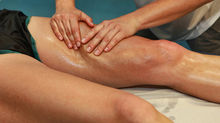Calcium - What, when & how much?
- The Studio Team
- Mar 8, 2023
- 3 min read
Updated: Mar 9, 2023
We’ve all heard that calcium is important for children to build strong bones, but what about our calcium needs as we move out of childhood and into different phases of our lives?
Calcium is an important mineral required not only for healthy bones but also muscle and nerve function. Most of our calcium is stored in our bones. When we aren’t getting enough from our diet, our body will draw on those stores. Lower calcium stores in our bodies can bring on poorer bone health and lead to issues like osteoporosis. Those with poor bone health are more likely to have problems repairing bones if they fall and can lead to further complications.
But how do we get enough?
To many people’s surprise, dairy products like milk, cheese, yoghurts, kefir, etc are not the only sources of calcium that we can include to reach our requirements. Foods such as leafy greens, sardines, broccoli, tofu, legumes, and products specifically fortified with calcium like some plant-based milks or orange juice will help get to that recommended daily intake. Below are the recommendations for several population groups:

The requirements are slightly higher for young pregnant women to aid with continuing bone development in addition to growing a baby, and for women over 50 and men over 70.
There are ways to improve/reduce absorption of the calcium we eat
Research shows that adding sources of vitamins C, K, and D to meals that have sources of calcium help your body take in and use as much calcium as possible. In contrast, there is some evidence to say that caffeine intake with a meal can reduce its absorption.
What could this look like at meal time?

Overnight oats served with yoghurt (calcium) and strawberries (vitamin C)
Oven roasted salmon (vitamin D) with soba noodles, steamed leafy greens (calcium) and a sesame dressing
Tacos with scrambled tofu (calcium), sauteed onion and capsicum (vitamin C) with salsa and avocado (Vit C, K)
When could it be a good idea to supplement with extra calcium?
The answer, like many things to do with health, is “it depends”. It depends on the person, their medical history and other lifestyle factors. It’s recommended you have a chat to your doctor or accredited practising dietitian if you think you struggle to achieve enough calcium through food or are thinking about supplementation. There are medications and lifestyle factors that may increase your calcium requirements. And then there can be some interactions that can reduce your requirements—so to be safe, it’s always best to check with a medical or health professional first.
Is there such a thing as too much calcium?
Although we need it to pump our hearts and regrow our bones, excessive calcium or “hypercalcaemia” is a thing. The recommended upper limit is 2500mg per day for adults under 50 and 2000mg for those over 50. Again speaking to your healthcare professional is the best way to take any guesswork out of your requirements.
Book in for a chat if you have questions about calcium in your diet or whether supplementation may be right for you.
References:
National Health and Medical Research Council. n.d. Nutrient Reference Values. [online] Available at: https://www.nrv.gov.au/nutrients/calcium.
National Institutes of Health: Office of Dietary Supplements. “Calcium: Health Professional” [online] Available at:< https://ods.od.nih.gov/factsheets/Calcium-HealthProfessional/#h6>.
Harvard University. Harvard T.H. Chan School of Public Health. “Calcium”. [online]. Available at:< https://www.hsph.harvard.edu/nutritionsource/calcium/>.





























Comments